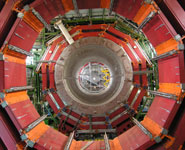The sense of anticipation at the University of Bristol is huge and comes after more than twenty years’ work on the design, construction and commissioning of the LHC’s detectors.
The detectors are similar to vast digital cameras and can record the results of particle collisions up to 40 million times per second. The Bristol team has contributed new sensors that can precisely measure the collision fragments, vital for the discovery of the missing Higgs boson particle.
The collisions of minute particles – protons – will be at the highest energy ever achieved in a particle accelerator – 7 TeV (1 TeV = a million, million electronvolts).
“The experiments at the LHC are the most challenging we’ve ever attempted, and the results could revolutionise our understanding of nature”, said Professor Greg Heath, who works on the CMS project. “The Bristol University team also has a key role in interpreting the data and some of the first discoveries could be made in Bristol.”
The new LHC particle accelerator is housed in a giant laboratory at CERN, buried 100m below mountains on the Swiss-French border in a 27km long circular tunnel.
Bristol University physicists, based at CERN, will be at the front line in ensuring the data taken by the experiments goes smoothly on Tuesday. The particle physics group at the University is a major collaborator in two of the four LHC experiments – CMS and LHCb.
The experiments will recreate conditions that existed just a billionth of a second after the Big Bang and seek answers to some of the deepest mysteries of the origins and workings of our universe
Professor Nick Brook who works on the LHCb experiment explained: “Over the next two years we will investigate how and why does the Universe exist? Can we identify the unknown particle that makes up over 90 per cent of the Universe? Can we unlock the mystery of anti-matter – why do we live in a world of just matter?”
Once 7 TeV collisions have been established, the plan is to run the LHC continuously for a period of 18-24 months, with a short technical stop at the end of 2010. This will bring enough data across all the potential discovery areas to firmly establish the LHC as the world’s foremost facility for high-energy particle physics.
Bristol University physicists will be at the forefront of these potential discoveries. The University will host part of the LHC data on the new storage facility attached to the University’s High Performance Computer, BlueCrystal.
